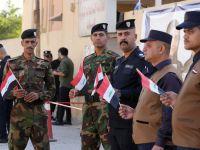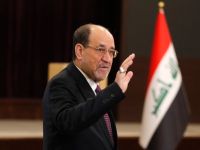Israeli Prime Minister Ehud Barak held formal talks Monday with hawkish right-wing leader Ariel Sharon but the two failed to agree on forming an emergency government following the hostile Arab summit.
The two men agreed to meet again late on Tuesday, a Likud official said.
The leaders met along with top officials of their Labor and Likud parties at the prime minister's office.
The prime minister, without a parliamentary majority for more than three months, hopes to put together a new government before the 120-member Knesset opens its winter session on October 30.
Barak announced his intention to form a "government of national emergency" two weeks ago at the height of unrest in the Palestinian territories, which to date has killed 134 people, all but a handful of them Arabs.
Following a hostile Arab summit and his announcement of a freeze in the peace process, Barak badly wants to bolster his minority government for a long cold war, or possibly a hot one, against the Palestinians.
He has paid no heed to critics, even within his own cabinet, who suggested Sharon's inclusion in an enlarged government would signal the death knell for the seven-year peace process.
"Such times call for responsibility, leadership and the refusal to be dragged along by provocation on one hand, or capitulate on the other, as well as the preservation of a stable, considered and firm line of operation," he told his cabinet Sunday.
But Barak's proposal was dealt a blow Monday by Shas, the ultra-Orthodox party that is Israel's third largest, which said it would not join a unity government.
Shas, a kingpin in successive coalition governments, walked out of the Labor-led government in July on the eve of the failed Camp David peace summit with the Palestinians.
Barak's talks with Sharon have prompted a storm of opposition, both on the left and the right.
Those inside Barak's cabinet who have spoken out against the move include former prime minister Shimon Peres, Justice Minister Yossi Beilin, acting Foreign Minister Shlomo Ben Ami and and Integration Minister Yuli Tamir.
Likud itself is sharply divided, with a number of the right-wing party's officials demanding in a letter to Sharon that several conditions be fulfilled before he participates in an emergency government.
"We want (Barak) to publicly renounce the informal understandings reached with the Palestinians at Camp David," Likud spokesman Ofir Akunis told AFP.
Barak's reported concessions at the failed US talks in July included an Israeli pullback from 90 percent of the West Bank and the transfer to Palestinian control of some areas of Arab east Jerusalem, which Israeli has held since the 1967 Middle East war.
"It must be clear that Israel will not compromise the sovereignty of Jerusalem, that it will not accept the return of Palestinian refugees or give up the Jordan Valley," the Likud spokesman added.
Likud sceptics want a time limit on any shotgun wedding with Barak, and early elections.
On the table for Likud was entry to a joint security cabinet, which government spokesman Yitzak Hertzog said Monday would be part of a unity government.
"It will be agreed that any peace initiative for permanent status will be brought to the government and discussed by that cabinet."
Hertzog rejected the notion that Sharon, despised by Palestinians, would alienate Palestinian leader Yasser Arafat.
"I think it's known that when he (Arafat) spoke to Western leaders he said, 'Well, I've seen Sharon at Wye,'" the 1998 Israeli-Palestinian summit hosted by the United States.
"So he's aware of Sharon. Sharon was there when they signed the Wye accords," he said.
Hertzog said that at a cabinet meeting Sunday Barak had reminded his critics of Likud's past, as if illustrating his point that involving Sharon did not necessarily mean peace was taking a back seat in Israel's priorities.
"He said, 'Remember, the Likud government was the one that signed the agreement with (former Egyptian president) Anwar Sadat. .. It was the Likud government that shattered the dream of a greater Israel by signing Wye, giving up 10 percent (of the occupied territories),' so things should be looked at in a much more complicated way, not in a black and white way." – JERUSALEM (AFP)
© 2000 Al Bawaba (www.albawaba.com)









